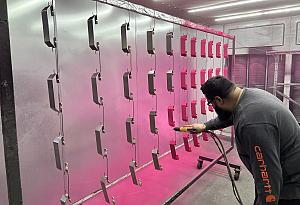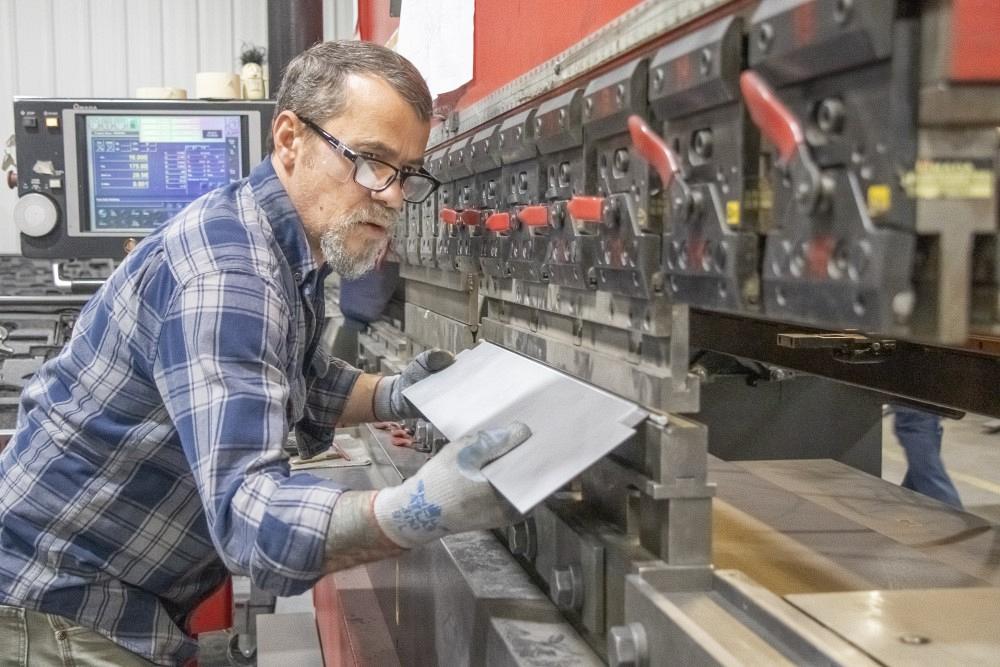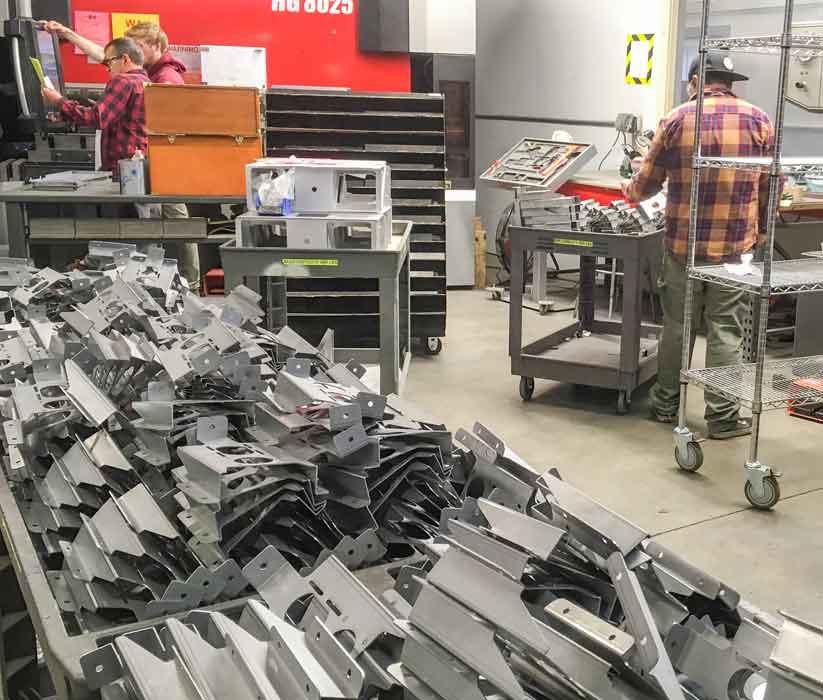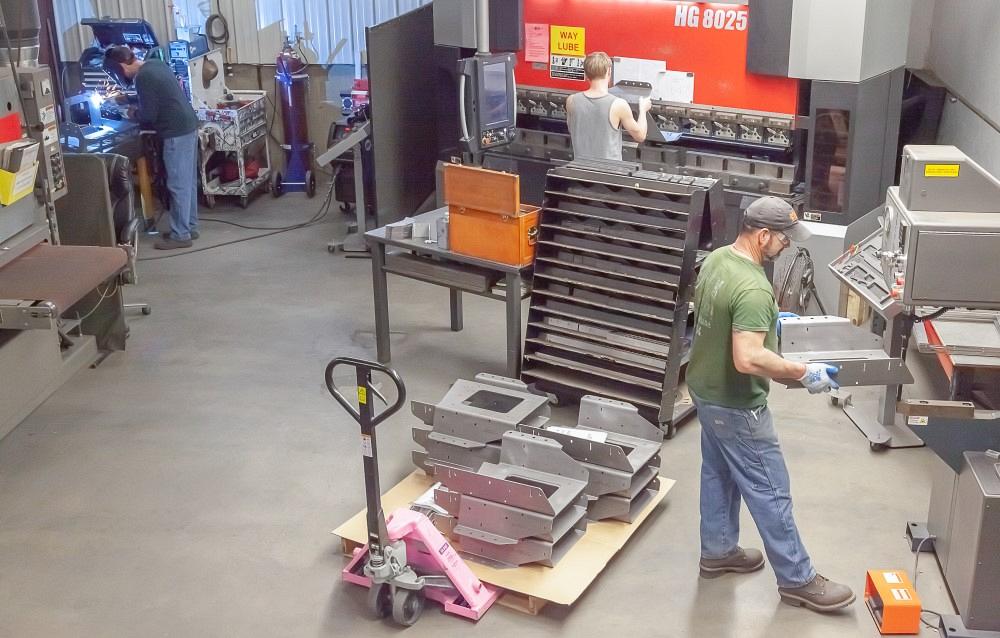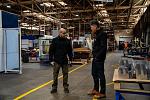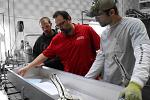Senior Editor
- FMA
- The Fabricator
- FABTECH
- Canadian Metalworking
Categories
- Additive Manufacturing
- Aluminum Welding
- Arc Welding
- Assembly and Joining
- Automation and Robotics
- Bending and Forming
- Consumables
- Cutting and Weld Prep
- Electric Vehicles
- En Español
- Finishing
- Hydroforming
- Laser Cutting
- Laser Welding
- Machining
- Manufacturing Software
- Materials Handling
- Metals/Materials
- Oxyfuel Cutting
- Plasma Cutting
- Power Tools
- Punching and Other Holemaking
- Roll Forming
- Safety
- Sawing
- Shearing
- Shop Management
- Testing and Measuring
- Tube and Pipe Fabrication
- Tube and Pipe Production
- Waterjet Cutting
Industry Directory
Webcasts
Podcasts
FAB 40
Advertise
Subscribe
Account Login
Search
How does a metal manufacturer grow during a recession?
Three ways: Cross-training, quick response, and customer diversity
- By Tim Heston
- June 19, 2020
- Article
- Shop Management
Prototek Inc. is No. 35 on the 2020 FAB 40. Click here for a complete list of this year's participants.
PJ Swett began his career at Prototek as a part-time shipping clerk a dozen years ago, entering metal fabrication as a true greenhorn. In March 2019 he became vice president of operations.
“We have so many examples here of people like me who worked their way up the ladder. As an employee, the ball’s in your court. If you come in every day willing to make a difference, take pride in what you do, and put the time in to separate yourself, you’ll grow here at a rapid pace. People see it happening all around them, and it really drives our workforce.”
Swett said this in mid-April amid the pandemic-induced economic fallout. If at that time you visited Prototek’s Contoocook, N.H., sheet metal fabrication plant, you’d see evidence of a pandemic—people wearing masks and gloves and keeping their distance—but you wouldn’t see signs of an economic fallout. The shop was busy. It had even hired a few people who used to work in the restaurant industry.
Location has something to do with it. The economic effects of the COVID-19 shutdown are widely varied across the country and across different supply chains. As of late April many fabricators in New England, with their strong ties to the medical and defense sectors, were still very busy—in stark contrast to fabricators in other areas serving industries like automotive and oil and gas.
Prototek isn’t just a New England shop, though. Besides its New Hampshire fabrication and machining plants, the $31 million company has facilities in Grafton, Wis., and Sunnyvale, Calif. Its niche of prototype and low-volume work means the shop floor processes a broad mix of jobs at any given time. It’s a quick-turn operation; some jobs are delivered within two weeks, but many are turned around in one to three days.
Prototek’s business centers around diversity in various forms, all of which could be grouped into two broad categories: processes and people. Analyze Prototek’s strategies around both and you can see just how resilient custom metal fabrication is, even in the face of a pandemic unprecedented in modern times.
Processes
Bruce, Brian, and Roger Isabelle launched Prototek in 1987 as a small job shop in Concord, N.H. In 2003 the company moved to its current location in Contoocook. Growth continued steadily over the years until 2017, when the founders sold the business to CORE Industrial Partners, a private equity firm out of Chicago.
Years ago private equity gained a reputation in this business for the infamous “strip and flip,” but according to sources, CORE has done nothing of the kind. In fact, the firm gave Prototek the capital it needed to expand. Over the past two years Prototek purchased a machine shop in Sunnyvale, Calif., called Hayes Manufacturing, as well as Cal-X, a sheet metal and machining operation in Grafton, Wis.
These locations gave Prototek a much larger geographic footprint. That’s obvious, but what’s far subtler is how the new ownership affected Prototek’s processes. The company refined operations in many ways, but those refinements didn’t rip out the foundations that made Prototek successful in the first place.
Over the past two decades the company has instituted many practices of continuous improvement. Managers take daily gemba walks. Operators use tools from 5S shadow boards and refer to highly visible, color-coded schedules posted throughout the plant, among other lean practices.
That said, managers also maintain a healthy balance between refining processes and maintaining flexibility. “Manufacturing seems to be getting to a point where many people are becoming so process-oriented that they forget about the result. Prototek is all about developing and refining processes and systems, but only when they support our desired outcomes, including a customer retention rate of 90% or more, on-time delivery, and quality parts going out the door. We’re not making processes for the sake of making processes,” Swett said.
To illustrate, Swett described the machine layout at the fabricator’s main plant in New Hampshire. Within an expedite cell, some of the company’s most experienced operators bring one-off and low-volume parts off the laser and through every stage of production, including deburring, bending, hardware insertion, welding, and grinding.
“Jobs delivered in three days or less usually go directly through the expedite cell,” Swett said. “It’s single-piece part flow from one machine to the next, and it’s designed not to compromise our legacy work.”
Separating the expedite work helped eliminate the emergency teardown and setups at press brakes and other equipment—a relatable experience for anyone who has worked in high-product-mix manufacturing. That said, Prototek is still a job shop, so everyone needs to deal with exceptions. For instance, if a quick-turn job involves a part that doesn’t fit the expedite cell’s 8-ft. brake, managers evaluate available capacity and route the bending through a larger brake in the bending department.
“We do this without pushing any other work out of the way,” Swett said. “And we use a color-coded system to identify that a certain machine is now being used for an expedite job.” On some days, for instance, operators might arrive and find certain brakes in the bending department with a yellow traveler and large yellow magnets on the machine frame—a simple system that shows everyone that the machine is processing, or is about to process, a rush order.
This exemplifies the company’s 80-20 approach, or Pareto principle, whereby roughly 80% of the effects come from 20% of the causes. Roughly 20% of all the possible part parameters within Prototek’s expedite work create 80% of the results, so it makes sense to create a cell around those parameters.
The trick is to build processes where it makes sense and then handle the exceptions as pragmatically as possible. There’s no need for scrutinizing a process exhaustively just to squeeze slightly better efficiencies around oddball jobs that Prototek might never see again.
People
Few employees focus just on the process in front of them for years on end. Instead, continual cross-training is the norm. “Employees have a ‘home,’ as we call it,” Swett explained, “which establishes who you’ll be reporting to every day. But that doesn’t mean you’ll be working in that position always. We work very hard to cross-train all of our employees. That way, we can move chess pieces as needed to get what we need to get done every day.”
This holds true even for a hands-on job like welding. In fact, Swett reported that more than half of Prototek’s welders started at the company doing something else. “They came to us with zero welding experience,” he said, “and they’re now professional welders.”
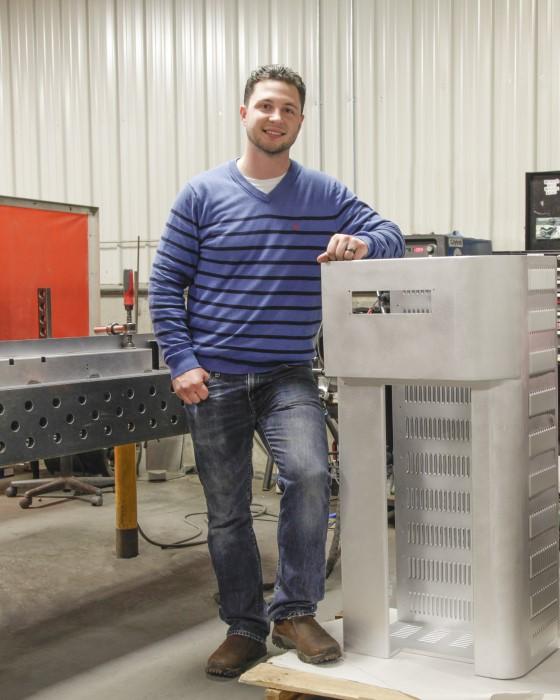
PJ Swett began his career at Prototek as a part-time worker in the shipping department in 2008. He’s now vice president of operations.
Many welders started in grinding, and for good reason. Grinders know what a good weld bead looks like, and they also appreciate how an expert welder can make a grinder’s work easier. Subsequent cross-training further emphasizes the fact that it’s not just about the weld bead in front of the grinder, but about the weld, about the blanks fixtured for the welder, and about the bending and cutting process before that. It’s not about the grinding; it’s about the end-to-end process.
Nowhere is this holistic view more important than sales and estimating. Employees might have a good personality for sales and be keenly perceptive to social cues. “Still, they might not have enough experience,” Swett explained. “But once they know the process and they’ve been here for a certain period of time, it’s a nonissue.
“There’s basically not a thing I haven’t done here. I started out running the shear, then went to deburring, ran turret presses, then on to welding, then to forming, then hardware insertion, screen printing, engineering, purchasing, and, finally, estimating.”
So said Chad Magoon, Prototek’s estimating manager who has been with the company more than 20 years. The number of years matters, but so too does his broad experience. Magoon uses SolidWorks, enterprise resource planning, and associated software to develop a quote. But he also knows that the people sending the request for quote care about quality and, especially, speed.
“What people think takes weeks to quote, we’ve quoted in minutes,” Magoon said, adding that most bids come with a range of delivery options; a choice of next day, three days, and five days is typical.
How does Magoon and his team quote so quickly, exactly? His answer involved three parts. First, estimators have years of experience with virtually every process on the floor and in the office. Second, the company has many in-house processes, so usually estimators don’t need to wait for pricing from outside vendors. Even when they do, they draw from extensive historical pricing records. Third, estimators know they work in a quick-turn business, so they know that calculating estimated costs to the nth degree at some point becomes wasted effort.
“The people who send us these quotes have deadlines,” Magoon said. “Nobody’s going to wait a week for a quote anymore.” This is especially true if a job entails just one part. “And we love jobs with just one part,” Magoon added.
These one-piece orders often lead to larger opportunities and help cast a broad net over an ever-expanding customer base. This has led to more opportunities for employees to cross-train and explore different career paths, which in turn leads to new ideas for process improvement and sales growth. The virtuous cycle continues and, at least at the time of this writing, has lessened the blow of the current crisis.
The economic paralysis that has hit many supply chains—including oil and gas and automotive—can’t yet be seen at Prototek, now a critical supplier of direly needed fabricated metal, including a fair number of ventilator parts. The company is proof that, even during these tumultuous times, custom metal fabrication isn’t a bad place to be.
About the Author

Tim Heston
2135 Point Blvd
Elgin, IL 60123
815-381-1314
Tim Heston, The Fabricator's senior editor, has covered the metal fabrication industry since 1998, starting his career at the American Welding Society's Welding Journal. Since then he has covered the full range of metal fabrication processes, from stamping, bending, and cutting to grinding and polishing. He joined The Fabricator's staff in October 2007.
subscribe now

The Fabricator is North America's leading magazine for the metal forming and fabricating industry. The magazine delivers the news, technical articles, and case histories that enable fabricators to do their jobs more efficiently. The Fabricator has served the industry since 1970.
start your free subscription- Stay connected from anywhere

Easily access valuable industry resources now with full access to the digital edition of The Fabricator.

Easily access valuable industry resources now with full access to the digital edition of The Welder.

Easily access valuable industry resources now with full access to the digital edition of The Tube and Pipe Journal.
- Podcasting
- Podcast:
- The Fabricator Podcast
- Published:
- 04/16/2024
- Running Time:
- 63:29
In this episode of The Fabricator Podcast, Caleb Chamberlain, co-founder and CEO of OSH Cut, discusses his company’s...
- Industry Events
16th Annual Safety Conference
- April 30 - May 1, 2024
- Elgin,
Pipe and Tube Conference
- May 21 - 22, 2024
- Omaha, NE
World-Class Roll Forming Workshop
- June 5 - 6, 2024
- Louisville, KY
Advanced Laser Application Workshop
- June 25 - 27, 2024
- Novi, MI



